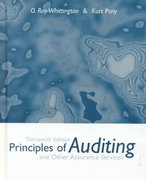Select the best answer for each of the following questions and explain the reasons for your choice.
Question:
Select the best answer for each of the following questions and explain the reasons for your choice.
a. If a CPA recklessly performs an audit, the CPA will be liable to third parties who were unknown and not foreseeable to the CPA for:
(1) Strict liability for all damages incurred.
(2) Gross negligence.
(3) Either ordinary or gross negligence.
(4) Breach of contract.
b. A CPA issued an unqualified opinion on the financial statements of a company that sold common stock in a public offering subject to the Securities Act of 1933. Based on a misstatement in the financial statements, the CPA is being sued by an investor who purchased shares of this public offering. Which of the following represents a viable defense?
(1) The investor has not proven fraud or negligence by the CPA.
(2) The investor did not actually rely upon the false statement.
(3) The CPA detected the false statement after the audit date.
(4) The false statement is immaterial in the overall context of the financial statements.
c. Which of the following elements is necessary to hold a CPA liable to a client?
(1) Acted with scienter or guilty knowledge.
(2) Was not independent of the client.
(3) Failed to exercise due care.
(4) Did not use an engagement letter.
d. Which statement best expresses the factors that purchasers of securities registered under the Securities Act of 1933 need prove to recover losses from the auditors?
(1) The purchasers of securities must prove ordinary negligence by the auditors and reliance on the audited financial statements.
(2) The purchasers of securities must prove that the financial statements were misleading and that they relied on them to purchase the securities.
(3) The purchasers of securities must prove that the financial statements were misleading; then, the burden of proof is shifted to the auditors to show that the audit was performed with "due diligence."
(4) The purchasers of securities must prove that the financial statements were misleading and the auditors were negligent.
e. The most significant result of the Continental Vending case was that it:
(1) Created a more general awareness of the possibility of auditor criminal prosecution.
(2) Extended the auditor's responsibility to all information included in registration statements.
(3) Defined the CPA's responsibilities for unaudited financial statements.
(4) Established a precedent for auditors being held liable to third parties under common law for ordinary negligence.
f. The 1136 Tenants' case was important because of its emphasis upon the legal liability of the CPA when associated with:
(1) A review of annual statements.
(2) Unaudited financial statements.
(3) An audit resulting in a disclaimer of opinion.
(4) Letters for underwriters.
Step by Step Answer:

Principles Of Auditing And Other Assurance Services
ISBN: 9780072327267
13th Edition
Authors: Ray Whittington, Kurt Pany





